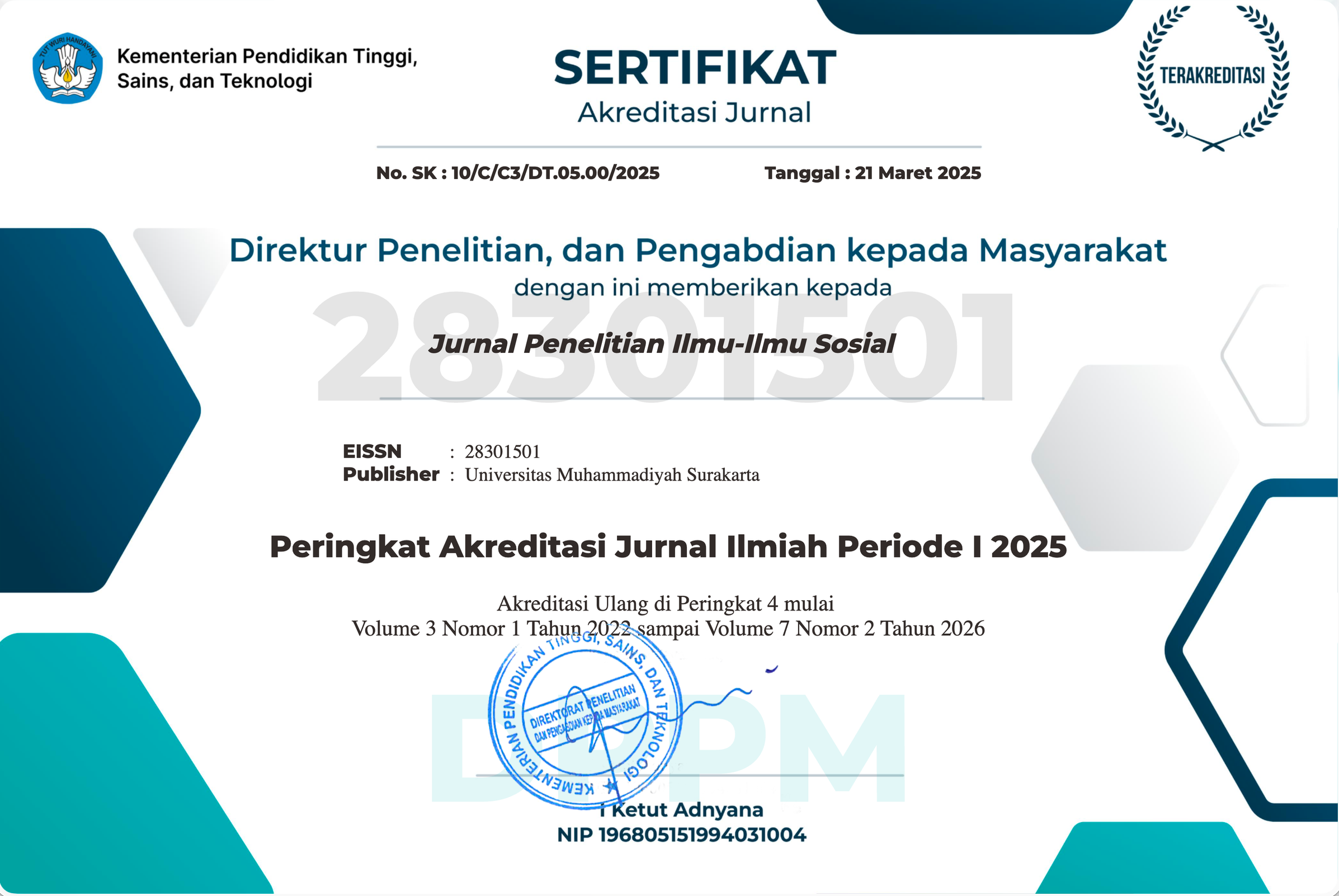Understanding Extraversion in Indonesian Adolescents: A Big Five Personality Analysis of High School Students in Surabaya
DOI:
https://doi.org/10.23917/sosial.v6i1.7952Keywords:
extraversion, high school students, personality, social interaction, social activitiesAbstract
Personality extraversion is an important aspect that influences the social development of adolescents, particularly high school students. While previous studies have highlighted extraversion in academic and social contexts, few have deeply examined how this dimension manifests in the social dynamics of students who are active in various social activities. This study aims to fill this gap by analyzing extraversion personality through six main aspects: affectionate, joiner, talkative, active, fun-loving, and passionate. Using a descriptive qualitative approach, four grade 11 students who are active in school organizations became the research subjects. Data were collected through semi-structured interviews and analyzed using thematic analysis techniques. The findings show that extraversion personality is not only related to the frequency of social interactions, but also the quality of interpersonal relationships as well as effectiveness in organizational activities. The novelty of this study lies in its contribution in expanding the landscape of adolescent personality studies with a focus on the context of intensive social participation and the balance between external needs and self-reflection. This study also offers practical contributions in the form of recommendations for educators and psychologists in designing social skills development programs as well as social exhaustion management strategies for extroverted individuals. The results of the study enrich the theoretical understanding of personality and can be the basis for the development of personality-based interventions in the school environment.
Downloads
References
Pervin, L.A., & P. Jhon, O. (1999). Handbook Of Personality (pp. 102–138). New York: Guilford Press.
Andika, M. V., & Yuliana, N. (2023). Meningkatkan Keterampilan Komunikasi di Kalangan Mahasiswa. Triwikrama: Jurnal Ilmu Sosial, 2(5), 2023–2064.
Sartika, I. A, Rahayu, S., & Nurmiyati, N. (2024). Pengaruh Big Five Personality terhadap Kepuasan Kerja Karyawan (Studi Kasus di Pt. Rumpun Sari Medini Kendal). Jurnal BISECER (Business Economic Entrepreneurship), 7. https://doi.org/https://doi.org/10.61689/bisecer.v7i1.524
Azzahra, S., Kusuma, I., Arsyad, M., & Kunci, K. (2024). Gambaran Burnout Syndrom terhadap Ciri Kepribadian Ekstrovert dan Introvert pada Mahasiswa Kedokteran di Jakarta. Junior Medical Journal, 2(9), 1040–1055. https://doi.org/10.33476/JMJ.V2I9.4067
Burhanudin, B., & Farid Bachtiar, M. (2024). Psikologi Kepribadian dalam Pendidikan Tinggi di Kampus. Excellent: Journal of Islamic Studies, 1(1), 28–40. https://ejournal.alfarabi.ac.id/index.php/excellent/article/view/573
Choirunisa, A., Keisha Rizki Lubis, B., Nafila, C., Dwi Ramadhani, F., & Rafifa Sari Daulay, M. (2024). The Balance Between Academic Activities and Mental Health High School Adolescents:Challenges and Solutions. MEDALION JOURNAL: Medical Research, Nursing, Health and Midwife Participation. https://doi.org/https://medalionjournal.com/https://medalionjournal.com/
Wedhayanti, G. C. (2023). Hubungan Kepribadian Big Five dengan Perilaku Bullying pada Siswa SMA. DAIWI WIDYA Jurnal Pendidikan. https://doi.org/https://doi.org/10.37637/dw.v10i3.1779
Dominika, & Virlia, S. (2018). Hubungan Kepribadian Ekstrovert-Introvert dan Penerimaan Sosial terhadap Siswa Difabel pada Siswa. Jurnal Konselor, 7(1). https://doi.org/10.24036/02018718735-0-00
Eysenck, H. (1990). Biological Dimensions of Personality. Handbook of Personality: Theory and Research, 244–276. https://psycnet.apa.org/record/1990-98135-010
Fadhilah, N. A. N., Suhartini, & Setyaning, A. N. A. (2023). Pengaruh The Big Five Personality terhadap Prestasi Akademik Mahasiswa. Indonesian Journal of Economics, Business, Accounting, and Management (IJEBAM), 2(2), 49–71. https://doi.org/10.12345/IJEBAM.V2I2.57
Fleeson, W., Malanos, A. B., & Achille, N. M. (2002). An Intraindividual Process Approach to The Relationship Between Extraversion and Positive Affect: Is Acting Extraverted As “Good” As Being Extraverted? Journal of Personality and Social Psychology, 1409–1422. https://doi.org/https://doi.org/10.1037/0022-3514.83.6.1409
Setiawan, M. I., & Yuliana, N. (2024). Extrovert merupakan Pengaruh Sikap terhadap Hubungan Interpersonal. Sindoro: Cendikia Pendidikan, 5(1), 31–40. https://doi.org/10.9644/SINDORO.V5I1.3869
Ishak Shabur, M. (2017). Pengaruh Big Five Personality terhadap Komitmen Organisasi pada Dosen di Universitas Negeri Jakarta (UNJ) [Universitas Negeri Jakarta]. http://repository.unj.ac.id/28169/
Isrokhimah, I. (2015). Pengaruh Trait Kepribadian Extraversion dan Keterampilan Sosial terhadap Kecenderungan Adiksi Smartphone pada Remaja [UIN Syarif Hidayatullah Jakarta]. https://repository.uinjkt.ac.id/dspace/handle/123456789/54242
Masyithah. (2021). Penerapan Teknik Keterampilan Sosial Emosional pada Pembelajaran IPA Materi Bioteknologi dan Produksi Pangan Siswa Kelas IX-1 di SMP Negeri 4 Bolo Tahun Pelajaran 2020/2021. JagoMIPA: Jurnal Pendidikan Matematika Dan IPA, 1(2), 135–146. https://doi.org/10.53299/jagomipa.v1i2.76
Deep, M. & Mathur, A. (2017). Emotional Intelligence, Adjustment and Quality of Interpersonal Relationship among Young Adults. International Journal of Indian Psychology, 5(1). https://doi.org/10.25215/0501.111
Muharromah, S. R., Ahmad, M. A., & Okditazeini, V. (2024). Fenomena Online Disinhibition Effect pada Individu Introvert. BATANANG: Jurnal Psikologi, 03(01). https://doi.org/http://dx.doi.org/10.31958/jp.v3i01.11743
Nugraha, G., & Zuhriah, Z. (2023). Kepribadian Introvert dalam Kemampuan Bersosialisasi pada Mahasiswa Ilmu Komunikasi. Jurnal Ilmu Komunikasi UHO : Jurnal Penelitian Kajian Ilmu Komunikasi Dan Informasi, 8(2), 223–231. https://doi.org/10.52423/jikuho.v8i2.39
Nurbaiti, F., Faradiba, A. T., & Aisyah. (2022). Peran Faktor Kepribadian Extraversion, Neuroticism Personality Trait terhadap Problematic Social Media Use pada Remaja Akhir Pengguna Twitter. JIVA: Journal of Behaviour and Mental Health, 3(1), 24–33. https://doi.org/10.30984/jiva.v3i1.2028
Nurrisa, F., & Hermina, D. (2025). Pendekatan Kualitatif dalam Penelitian: Strategi, Tahapan, dan Analisis Data. Jurnal Teknologi Pendidikan Dan Pembelajaran (JTPP), 02, 793–800. https://jurnal.kopusindo.com/index.php/jtpp/article/view/581
Rijali, A. (2018). Analisis Data Kualitatif. Jurnal Alhadharah, 17(33). https://doi.org/10.18592/alhadharah.v17i33.2374
Robert R. McCrae, & Paul T.Costa. (2003). Personality in Adulthood: A Five-factor Theory Perspective. Guilford Press.
Roesyanto, M., & Erdiansyah, R. (2021). Pengaruh Hubungan Self-Disclosure dan Kepribadian Extraversion terhadap Keterampilan Komunikasi Interpersonal Young Worker di Jakarta. Koneksi, 5, 353–358.
Rosito, A. C. (2018). Extraversion, Workplace Support, and Burnout: The Moderating Role of Neuroticism. Jurnal Psikologi Pendidikan Dan Konseling: Jurnal Kajian Psikologi Pendidikan Dan Bimbingan Konseling, 4(1), 6. https://doi.org/10.26858/jpkk.v4i1.3250
Schlotzhauer, A. E., Ehrhart, M. G., & Jex, S. M. (2025). Extraversion, workplace support, and burnout: The moderating role of neuroticism. Personality and Individual Differences, 232. https://doi.org/https://doi.org/10.1016/j.paid.2024.112845
Soto, C. J. (2018). Big Five Personality Traits. The SAGE Encyclopedia of Lifespan Human Development, 240–241. https://www.researchgate.net/publication/324115204
Subtinanda, A., & Yuliana, N. (2023). Kepribadian Ekstrovert dan Introvert dalam Konteks Komunikasi Antarpribadi Mahasiswa Ilmu Komunikasi UNTIRTA. Jurnal Pendidikan Non Formal, 1(2), 15. https://doi.org/10.47134/jpn.v1i2.187
Susanto, D., Jailani, Ms., & Sulthan Thaha Saifuddin Jambi, U. (2023). Teknik Pemeriksaan Keabsahan Data dalam Penelitian Ilmiah. QOSIM: Jurnal Pendidikan, Sosial & Humaniora, 1. http://ejournal.yayasanpendidikandzurriyatulquran.id/index.php/qosim
Utami, L. D., & Kartini. (2017). Faktor Demografis, Personality Traits, dan Overconfidence (Survey terhadap Investor Saham di Yogyakarta). Jurnal Siasat Bisnis, 20(2), 181–196. https://doi.org/10.20885/jsb.vol20.iss2.art6

Downloads
Submitted
Accepted
Published
Issue
Section
License
Copyright (c) 2025 Syifa Ainur Rafiqoh, Hayyin Farihatul Mauliyah, Nazalul Kharirotul Azizah, Cindi Kurniawati, Meita Santi Budiani

This work is licensed under a Creative Commons Attribution 4.0 International License.















